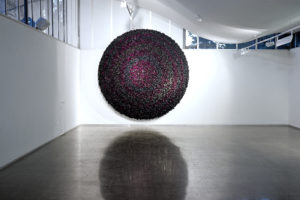 DANI Marti’s studio is near Cessnock. His monumental weavings are to be found in New York and his native Barcelona as well as in Sydney.
DANI Marti’s studio is near Cessnock. His monumental weavings are to be found in New York and his native Barcelona as well as in Sydney.
Yet he has chosen to show recent work at the University Gallery until November 12, attracted by its long axis and open floor space.
One end of the gallery is dominated by Black Sun, a three-metre diameter mandala encrusted with dark reflectors, emanating energy; at the other end is an openwork wire cube, constructed of repurposed mattress springs studded with the bright spheres of mandarins and lemons.
Its inherent decay makes it a vanitas object, a lesson in mortality, but the human connection implied in the recycled mattress leads us directly into Dani Marti’s other, for him, equally important body of work, the videos and photographic studies of intimate moments shared with other male HIV sufferers.
This is confronting. We are unused, as gallery visitors, to long voyeuristic real-life sequences of middle-aged men touching each other in therapeutic sexual encounters or for plain comfort. A narrative here involves Bob, a blind gay man in New York, whose ultimate pleasure comes from hearing male singing as much as from touch.
The gallery reverberates with long breathed notes.
The primacy of touch provides a new path into the woven works, though they appear as completely abstract grids of cords and ropes from the ships’ chandler or hard-wear shop, harsh to the hand. We delight in the varied textures and colour changes as much as in the taut precision of the surface.
Does it help or hinder our response to these skilfully crafted grids to know that for the weaver they embody one of many carefully staged intimate encounters?
Isn’t it enough for the viewer to appreciate these spectacular objects without their metaphor of skin and confessional encounters? You decide.